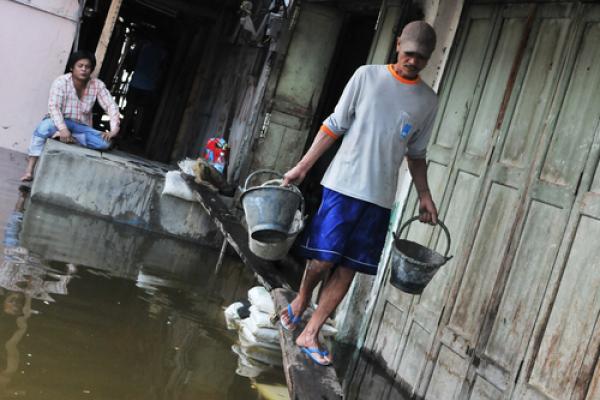If you are reading this and are from North America — and perhaps even if you aren't — you are no doubt aware of just how divisive the issue of climate change is in the US and Canada. Experts from both sides of the issue are regular installments on the 24-hour news networks, presenting the latest data in favor of or disputing the warming of the planet. Policy experts offer the pros and cons of legislation aimed at cutting greenhouse gas emissions. Law makers debate possible action steps. Facebook posts supporting or refuting climate change turn into hotbeds of political (and sometimes a little bit of personal) attacks. Friends bicker; family relationships are strained.
This is simply the reality of the political climate in North America, but the existence of such rigorous debate is no coincidence. If warming trends continue the way that scientists are currently projecting (four degrees celsius by the end of the century), things in North America won't look all that different. We'll probably experience more droughts, our growing zones will shift, and Michigan will have the climate of Tennessee. Even if things do get bad in North America, we have the money and technology necessary to adapt fairly well to any changes in weather patterns or growing seasons that we might experience. In short: North America can afford not to worry about climate change — at least for a while.
As the number of drone strikes against targets in Yemen has grown, the anger of the local people is also growing. The AP reports (via philly.com):
In its covert fight against al-Qaida in Yemen, the United States has dramatically stepped up its use of drone strikes the past year, scoring key successes against one of the most active branches of the terror network. With more than 40 strikes reported in 2012 and nine so far this year, Yemen has become the second biggest front in American drone warfare, after Pakistan.
But the escalation has meant more civilians getting caught in the crossfire.
Civilian deaths are breeding resentments on a local level, sometimes undermining U.S. efforts to turn the public against militants. The backlash is still not as large as in Pakistan, where there is heavy pressure on the government to force limits on strikes, but public calls for a halt to strikes are starting to emerge.
Read more here.
Lawrence Wilkerson, chief of staff to Secretary of State Colin Powell, reviews a new book in Al Jazeera — Akbar Ahmed's The Thistle and the Drone: How America's War on Terror Became a Global War on Tribal Islam.
In the Cold War, the US funded and supported any regime, dictatorship or democracy, that opposed communism. From US support for the cruel and brutal dictator in Cuba, Fulgencio Batista, to the Shah of Iran whose support by the US still haunts US-Iran relations, to the leader of Iraq whom the US first supported and then overthrew, Saddam Hussein, there was no virtue not sacrificed in the American quest to subvert and defeat communism. Today, that zeal - and the money and effort backing it - has morphed into US tactics to defeat terrorism.
Under the Obama administration, the principal instrument of these tactics is the drone. Professor Ahmed's book provides a searing indictment of the use of that instrument.
Read more here.
In the fourth chapter of John’s Gospel Jesus speaks with a woman when they find themselves alone at a well at midday. We can learn a lot from what he says to her, and from what he chooses not to say.
Jesus tells the woman, “Go, get your husband, and bring him here.” She replies, “I have no husband.” Jesus tells her “That’s right. You’ve had five husbands, and the man you’re now with isn’t your husband.”
These could have been shaming words. In her culture, to be without a husband is to risk economic ruin, and to have been divorced by your husband is to be shamed.
Had he wanted to, Jesus could have scored some serious points here: I’m a prophet, and you’re a sinner. I’m celibate, and you’re promiscuous. You are living in sin by living with a man who is not your husband.
Evidently, he didn’t want to say those things.
Making an ultimatum about church attendance to a sleep-deprived teenager may be my own version of hell on earth.
“We are leaving for church in 10 minutes,” I said, summoning my most authoritative voice before the lifeless lump under the covers.
My seven-year old Annie Sky watched the tense exchange between me and my 14-year old daughter Maya, who made periodic moans from the top bunk. With furrowed brow, my first grader sat on the couch, as if observing a tiebreaker at Wimbledon with no clear victor in sight.
For a moment, I wondered why I had drawn the line in the Sabbath sand, announcing earlier in the week that Maya would have to go to church that Sunday morning after an all-day trip to Dollywood with the middle school band. Somehow I didn’t want Dolly Parton’s amusement park to sabotage our family time in church. (The logic seemed rational at the time).
When Maya lifted the covers, I glimpsed the circles under her eyes and sunburn on her skin. But I repeated my command, with an undertone of panic, since I wasn’t sure if I could uphold the ultimatum.
When she finally got into the car, I breathed deeply and turned to our family balm, the tonic of 104.3 FM with its top 40 songs that we sing in unison. As the drama settled, I realized one reason why I made my teenager go to church: I want my daughters to know that we can recover from yelling at each other (which we had) and disagreeing. We can move on, and a quiet, sacred space is a good place to start.
Now that the Senate's Gang of Eight has published its immigration proposal TIME has put together four hurdles to the bill becoming law.
Problem #1: Stalling tactics from the right. Conservatives may stall the bill calling for "more hearings, more transparency, more opportunities to tweak the legislation to their liking"
Problem #2: Pushback from the left. Immigrants rights groups feel the 13-year path to citizenship is too long and gay-rights advocates want greater protections fro same-sex couples.
Problem #3: The cost for taxpayers. The cost of immigration reform has not been officially calculated. Conservatives are touting a large price tag as a reason to derail the legislation.
Problem #4: The conservative media storyline. Conservative media remains split between those who support immigration reform out of "sheer political imperative" and those who hope to divide the Gang of Eight.
For more indepth explanations of each hurdle, click here.
A NASA led study found climate change may increase rainfall in some areas and drought in other areas. The study predicts for every 1 degree Fahrenheit increase in global average temperature, heavy rainfall will increase globally by 3.9%. The Los Angeles Times reports.
"These results in many ways are the worst of all possible worlds," said Peter Gleick, a climatologist and water expert who is president of the Pacific Institute, an Oakland research organization. "Wet areas will get wetter and dry areas will get drier."
Read more here.




